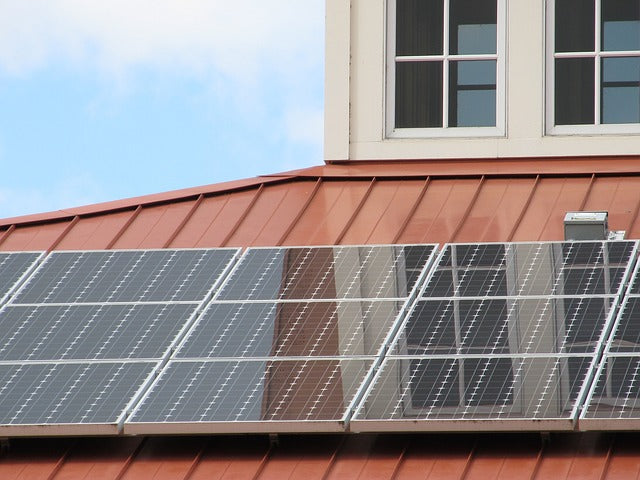https://en.solarbe.com/home/article/info/catId/49/id/5784.html
Commerce buys time to review solar module dumping claim

A container ship at the Port of Los Angeles. Credit: Flickr/Corey Seeman
The U.S. Department of Commerce gave itself another 15 days to wrap up an initial review of a bid by a domestic solar manufacturer seeking tariffs to be imposed on module imports from four Asian countries.
In a one-page statement dated March 10, Commerce said it needed more time to review and assess what it described as “novel and complex” issues raised by Auxin Solar’s request. Commerce set a March 25 deadline to complete its initial review.
In February, Auxin Solar—which described itself as a minority- and woman-owned domestic producer of solar modules based in San Jose, California–asked Commerce in a 105-page petition to determine that solar cells and modules assembled in Malaysia, Thailand, Vietnam, and Cambodia are circumventing and undermining the effectiveness of U.S. trade remedy laws.
“The Government of China and major Chinese producers simply refuse to trade fairly,” said Mamun Rashid, CEO of Auxin Solar in a statement at the time. He said that rather than ending Beijing’s subsidization of the solar supply chain and raising prices, the Chinese producers moved operations to another country as an export platform to “continue assaulting the U.S. market with incredibly cheap products.”
In a statement, Abigail Ross Hopper, president and CEO of the Solar Energy Industries Association, called the petition “frivolous” and said the trade group would “aggressively” oppose it. “This is yet another attempt to abuse U.S. trade laws and cause serious economic harm to the American solar industry and its 230,000 workers, shockingly, all at the behest of a single company,” Hopper said.
200 companies
Some 200 solar companies signed on to a March 9 letter to Commerce Secretary Gina Raimondo asking her to reject the petition. The letter said the proposed tariffs “unfairly target cells and modules” from four countries that account for the “vast majority” of U.S. supply. It claimed the duties, possibly ranging from 50-250%, would “stall projects” and lead to the loss of 15,000 domestic solar manufacturing jobs.
(Read “Clean energy supply chains need ‘significant’ improvement, DOE report finds.”)
The petition said that the anti-circumvention statute does not limit the size of the party that files an allegation. It said that domestic producers like Auxin Solar “would have much more capacity” if they could sell crystalline silicon photovoltaic (CSPV) modules under “fair competitive conditions.”
It said that at present, low-cost CSPV cell and module imports from Malaysia, Thailand, Vietnam, and Cambodia that use inputs from affiliated Chinese suppliers “continue to undercut domestic producer pricing at key accounts” and limit the ability for Auxin Solar to reinvest and expand.
The petition named 15 module manufacturers that it alleged are circumventing U.S. anti-dumping laws. The companies are LONGi Malaysia and Vietnam, Jinko Solar, JA Solar, Trina Solar, Canadian Solar, Talesun, Light & Hope, GCL, Boviet Solar, Green Wing Solar, HT Solar, New East Solar, Enalex, Shenglong PV-Tech, and Jintek.
Anonymous petition
Last November, Commerce rejected a similar petition by an anonymous group of solar companies that sought tariffs on a handful of companies that import modules from Malaysia, Thailand, and Vietnam.
The request had been made by American Solar Manufacturers Against Chinese Circumvention (A-SMACC) and sought anti-dumping and anti-circumvention (AD-CVD) tariffs. In a November 10 decision, Abdelali Elouaradia, director of the Commerce Department’s AD-CVD office, said that A-SMACC’s bid to keep the names of its member companies from the public prevented Commerce from gathering needed information for any inquiry.
Elouaradia wrote that “not disclosing A-SMACC members’ names publicly hampers interested parties from fully commenting on the requests for circumvention inquiries and may hamper them from commenting on certain issues that could arise if Commerce were to initiate circumvention inquiries.”
The worry for SEIA and its member companies is that with Auxin stepping forward to ask for relief, Commerce may be more inclined to take up the petition for formal consideration.
In July, the Energy Information Administration’s (EIA’s) 2020 Annual Solar Photovoltaic Module Shipments Report listed Vietnam as the top source of PV imports to the U.S. at 8.1 million peak kilowatts. South Korea and Thailand combined were second at 4.4 million peak kilowatts, and Malaysia was third at 3.2 million peak kilowatts. The report lumped together imports from China, Hong Kong, Singapore, and Taiwan, which totaled less than 950,000 peak kilowatts.
Rising imports
The Auxin petition alleged that imports from Malaysia, Thailand, Vietnam, and Cambodia have risen by 868% over the last decade and “replaced Chinese imports completely.” The petition said that major producers in these countries “are all affiliated with Chinese producers of upstream inputs” and that their cost structure and pricing “is no different than if they still produced in China for the U.S. market.”
The petition alleged that some Chinese producers even admit that they set up facilities outside of China to avoid U.S. duties. For example, it said that Talesun Thailand, which is part of a Chinese group, advertises circumvention on its website stating that “we offer a solution adapted to markets affected by anti-dumping laws such as the United States.”
And, it alleged that Boviet Solar, a Vietnamese assembler that is owned by Chinese producer Boway, offers cost savings to buyers because “Vietnam is not a U.S. listed Anti-dumping and Countervailing region.”
In his statement, Rashid said that key upstream inputs in module manufacturing came from China with only assembly taking place outside of China. “This is textbook circumvention,” he said.
SEIA said in its letter to Secretary Raimondo that the U.S. could lose nearly 14 GW of solar deployment if the petition is granted and tariffs are imposed. The letter charged, “and all because a single company is seeking to inappropriately exploit the law for market advantage.”



